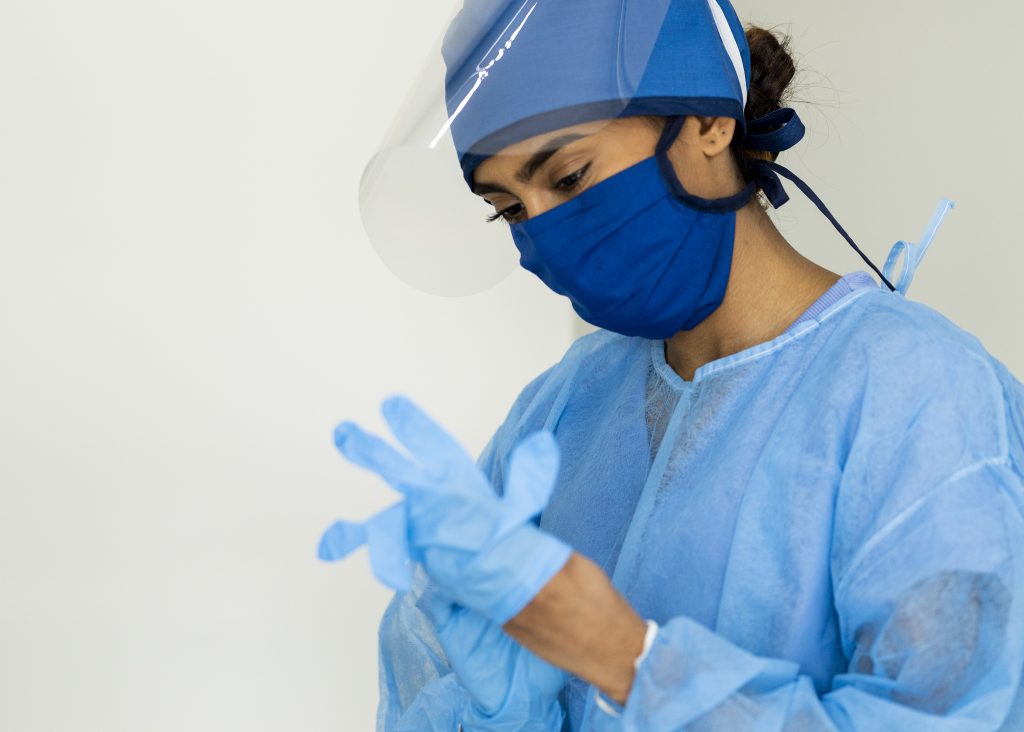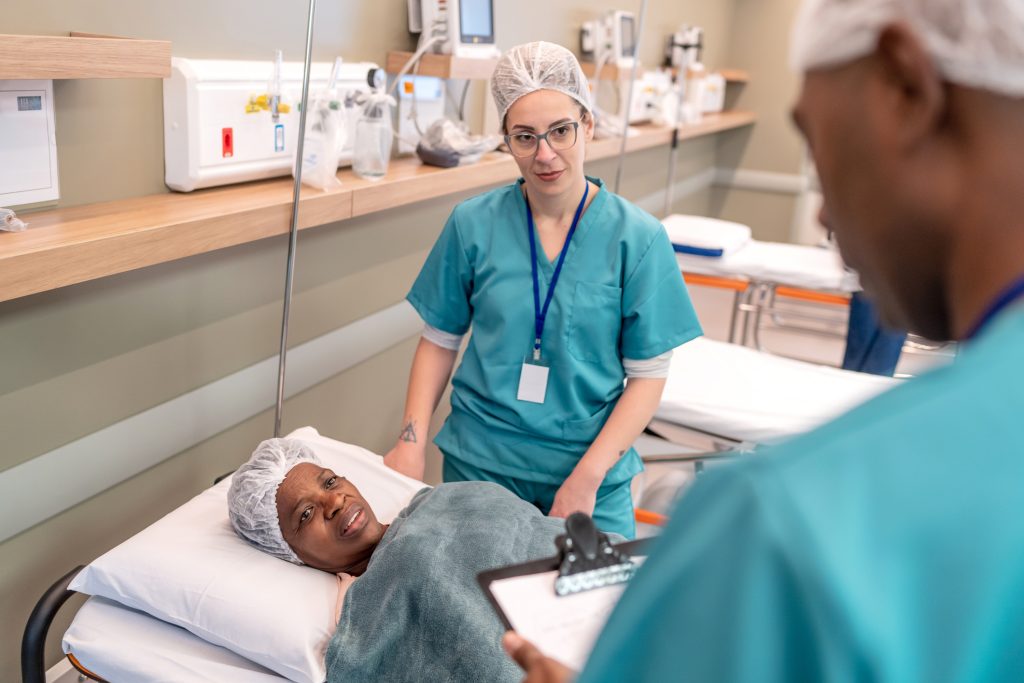Is Surgical Technology a Good Career? Discover the Benefits, Opportunities, and Growth
Published - January 21, 2025


Table of Contents
Are you interested in starting a new career in the medical field? Are you interested in medical technology and want to work in a team environment? If so, you may consider a job as a surgical technologist. So, are you asking yourself, “is surgical technology a good career?” Let’s start by learning what a surgical technologist does and then talk about all the benefits and growth opportunities you will receive after completing the Surgical Technology program at CBD College.
What Does a Surgical Technologist Do?
A Surgical Technologist, also known as a scrub tech or operating room (OR) tech, works closely with the surgical team which is made up of surgeons, nurses, and anesthesiologists. They ensure that surgical procedures are safe and have good health outcomes. The role of a surgical technologist involves preparing the operating room, assisting during surgeries, and maintaining a sterile environment.
Preparing for Surgery
Before a surgical procedure begins, the surgical technologist gets everything ready. They set up the operating room, and stock necessary surgical instruments, supplies and equipment. They arrange the surgical equipment for easy access during the procedure. The surgical technologist will create and maintain a sterile operating room to prevent infections and make sure that the operating room stays clean and sterile. Before the procedure, the surgical technologist will help position the patient on the operating table, properly drape them, and make sure monitors and other medical devices are ready for surgery.
Assisting During Surgery
Once the surgery begins, the surgical technologist works closely with the surgical team to ensure the procedure runs smoothly. They will pass instruments to the surgeon and assistants as needed, while anticipating what they will need next. The surgical technologist will maintain a sterile environment by ensuring that no contamination occurs and monitor team members and equipment to keep a sterile environment.
The surgical technologist will operate equipment such as suction machines, lights, and cameras used in laparoscopic procedures. They will also assist with robotic surgical systems. Part of this process is monitoring supplies by keeping track of instruments, sponges, and needles so they are not left inside the patient.
Post-Surgery Duties
After the procedure is completed, surgical technologists will help clean and restock the operating room to make sure it is ready for the next procedure. They will transport the patient back to the recovery room and document the surgical procedure to record which instruments were used while noting any abnormalities.
Is Surgical Technology a Good Career?
Yes, surgical technology is an excellent career choice if you are interested in healthcare and making a difference in patient outcomes. Here’s why:
High Demand for Skilled Professionals
The healthcare industry is growing rapidly, with a demand for surgical technologists to support operating room teams. The aging population and advancements in surgical techniques mean more surgeries and procedures, in turn there is a demand for surgical technologist to support those procedures.
Rewarding Work Environment
Each day presents new challenges and opportunities to work on a variety of surgical cases, from routine procedures to life-saving operations. There is always something new to learn and you will enjoy the comradery of the medical team.
Shorter Training Period
Unlike other healthcare roles that require years of study, you can become a surgical technologist at CBD College in as little 20 months, allowing you to enter the workforce faster.
What Are the Benefits of a Career in Surgical Technology?
A career in surgical technology offers many personal and professional benefits. As a surgical technologist, you will play a vital role in the operating room, working closely with surgeons, nurses, and other healthcare professionals to ensure the success of surgical procedures.
Job Stability and Demand
As the healthcare industry continues to grow, so does the demand for skilled surgical technologists. The aging population and advancements in surgical techniques contribute to your job security. Healthcare is also a stable industry, offering consistent employment opportunities regardless of economic conditions.
Never a Dull Moment
Every surgical procedure is different, keeping the job exciting and challenging. You may assist in a wide range of operations, from routine procedures to complex surgeries. Also, the operating room is a high-energy environment where you will take on new challenges and situations. It’s never a dull moment.
Hands-On Patient Impact
As a surgical technologist, you make a direct contribution to patient care. You play a significant role in ensuring the success of surgeries. Plus, your work directly impacts patient outcomes, making the job deeply rewarding. Also, knowing that your role contributes to saving lives and improving health can provide a profound sense of fulfillment.
Opportunities for Specialization
As a surgical technologist, you can specialize in fields such as cardiovascular surgery, orthopedics, neurosurgery, or robotics, allowing you to align your career with your passions. Plus, specializing often comes with opportunities to earn advanced certifications, which can lead to increased benefits.
Room for Career Growth
With experience and additional training, you can move into roles such as surgical first assistants, operating room managers, or educators. Plus, the skills and knowledge you gain in surgical technology can serve as a foundation for transitioning into other healthcare careers, such as nursing or physician assisting.
Team-Oriented Work
As a surgical technologist, you will work closely with surgeons, nurses, anesthesiologists, and other medical staff. This teamwork fosters a strong sense of camaraderie and mutual respect. You will be an essential part of a close-knit team that will add a sense of pride and accomplishment to the role.
Opportunities for Lifelong Learning
Advances in surgical techniques and medical technology mean you must stay up-to-date, providing opportunities for continuous learning and skill development. Many surgical technologists take advantage of ongoing training and certifications to enhance their expertise and stay competitive in the field.
What Are the Growth Opportunities in a Career in Surgical Technology?
The role of a surgical technologist offers many paths for career advancement. Whether you’re looking to enhance your skills, increase your earning potential, or take on more responsibility, there are several opportunities to grow. With experience and additional certifications, you can move into advanced roles such as:
Role #1: Surgical First Assistant
As a surgical first assistant, you will assist during procedures by suturing, controlling bleeding, or handling instruments. You will work alongside the surgeon and provide hands-on assistance to ensure the procedure is performed efficiently and safely. This role requires advanced training, technical expertise, and the ability to respond quickly in a high-pressure environment. Some of the core responsibilities include:
Pre-Surgery Preparation
• Review patient medical histories and surgical plans.
• Assist in positioning and draping the patient for surgery.
• Prepare and organize surgical instruments and equipment specific to the procedure.
• Ensure that the sterile field is maintained.
During Surgery
• Exposing the Surgical Site: Retracting tissues to provide better visibility for the surgeon.
• Suturing: Closing incisions or wounds with sutures or staples.
• Controlling Bleeding: Using hemostatic techniques like clamping, cauterizing, or tying off blood vessels.
• Manipulating Tissues: Holding or moving tissues to facilitate the surgeon’s work.
• Handling Instruments: Providing instruments and tools to the surgeon as needed.
• Performing Specialized Tasks: Depending on the surgery, you may place catheters, harvest veins for grafts, or assist with laparoscopic procedures.
Post-Surgery Duties
• Apply dressings or bandages to the surgical site.
• Assist in transferring the patient to recovery.
• Document the surgical procedure and provide input for postoperative care.
Role #2: Certified Surgical Technologist (CST)
You can gain a competitive edge by obtaining certification through organizations like the National Board of Surgical Technology and Surgical Assisting (NBSTSA). The benefits of becoming a certified surgical technologist include:
Leadership and Management
Experienced surgical technologists may transition into supervisory or management roles, overseeing operating room teams, scheduling, and training.
Educator Roles
If you’re passionate about mentoring others, you can become an instructor or program director for surgical technology students.
Transition to Other Healthcare Roles
Surgical technology can be a stepping-stone to other careers in healthcare, such as nursing, physician assisting, or healthcare administration. Many of the skills you acquire are transferable.
Specialization in High-Demand Fields
Focusing on emerging fields like robotic surgery or minimally invasive procedures can open doors to opportunities as technology evolves.
Final Thoughts
If you’re ready to take the next step, explore the accredited Surgical Technology program at CBD College, gain hands-on experience, and prepare to join a profession that’s as challenging as it is fulfilling. The operating room needs dedicated professionals like you!
Surgical Technologist Program
In our Surgical Technologist Program, you can get trained in as little as 20 months, working with doctors, nurses, and anesthesiologists. Train on your feet with professionals in our state-of-the-art mock surgery centers and get real on-the-job experience through our extensive network of clinical externship sites so you can be ready to tackle the field after you graduate.
Contact us now to learn more.
